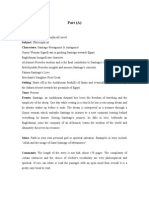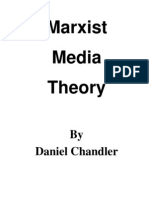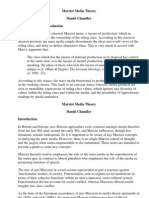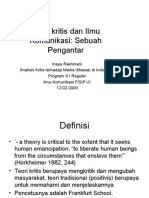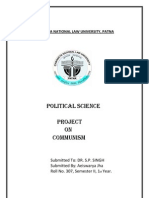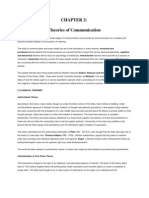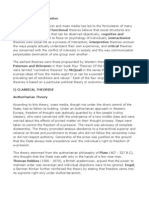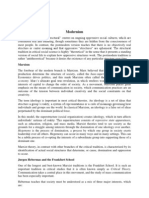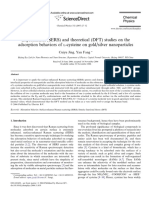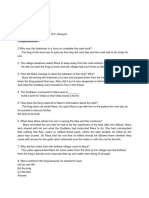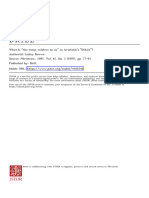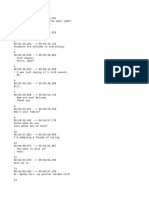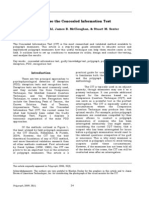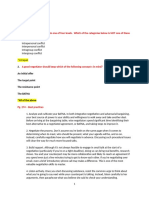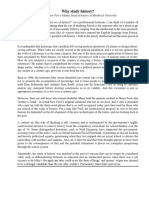Marxist Media Theory Daniel Chandler
Marxist Media Theory Daniel Chandler
Uploaded by
choryangelaCopyright:
Available Formats
Marxist Media Theory Daniel Chandler
Marxist Media Theory Daniel Chandler
Uploaded by
choryangelaOriginal Description:
Original Title
Copyright
Available Formats
Share this document
Did you find this document useful?
Is this content inappropriate?
Copyright:
Available Formats
Marxist Media Theory Daniel Chandler
Marxist Media Theory Daniel Chandler
Uploaded by
choryangelaCopyright:
Available Formats
Marxist Media Theory
Daniel Chandler
Opposition to functionalism
Opposition to liberal pluralism
Base and superstructure
Media as means of production
Ideology
Media as amplifiers
The constitution of the subject
Differences within Marxism
The Frankfurt chool
!lthusser
"ramsci and hegemony
tuart #all
$imitations of Marxist analysis
trengths of Marxist analysis
%eferences
In Britain and &urope' neo(Marxist approaches were common amongst media
theorists from the late )*+s until around the early ),+s' and Marxist influences'
though less dominant' remain widespread- o it is important to be aware of key
Marxist concepts in analysing the mass media- #owe.er' there is no single Marxist
school of thought' and the jargon often seems impenetrable to the uninitiated-
These notes are intended to pro.ide a guide to some key concepts-
Marxist theorists tend to emphasi/e the role of the mass media in the reproduction
of the status 0uo' in contrast to liberal pluralists who emphasi/e the role of the
media in promoting freedom of speech-
Opposition to functionalism
The rise of neo(Marxism in social science represented in part a reaction against
)functionalist) models of society- Functionalists seek to explain social institutions in
terms of their cohesi.e functions within an inter(connected' socio(cultural system-
Functionalism did not account for social conflict' whereas Marxism offered useful
insights into class conflict-
Opposition to liberal pluralism
!s the time of the &uropean ascendancy of neo(Marxism in media theory
1primarily in the 234+s and early 23,+s5' the main non-Marxist tradition was that of
liberal pluralism 1which had been the dominant perspecti.e in the 6nited tates
since the 237+s5 1see #all 23,89 :*(*:5- !s "ure.itch et al. put it9
;luralists see society as a complex of competing groups and interests' none
of them predominant all of the time- Media organi/ations are seen as
bounded organi/ational systems' enjoying an important degree of autonomy
from the state' political parties and institutionali/ed pressure groups- <ontrol
of the media is said to be in the hands of an autonomous managerial elite
who allow a considerable degree of flexibility to media professionals- !
basic symmetry is seen to exist between media institutions and their
audiences' since in Mc=uail)s words the )relationship is generally entered
into .oluntarily and on apparently e0ual terms)--- and audiences are seen as
capable of manipulating the media in an infinite .ariety of ways according to
their prior needs and dispositions' and as ha.ing access to what #alloran
calls )the plural .alues of society) enabling them to )conform' accommodate'
challenge or reject)- 1"ure.itch et al. 23,89 25
In contrast' they continue9
Marxists .iew capitalist society as being one of class domination> the media
are seen as part of an ideological arena in which .arious class .iews are
fought out' although within the context of the dominance of certain classes>
ultimate control is increasingly concentrated in monopoly capital> media
professionals' while enjoying the illusion of autonomy' are sociali/ed into
and internali/e the norms of the dominant culture> the media taken as a
whole' relay interpreti.e frameworks consonant with the interests of the
dominant classes' and media audiences' while sometimes negotiating and
contesting these frameworks' lack ready access to alternati.e meaning
systems that would enable them to reject the definitions offered by the media
in fa.our of consistently oppositional definitions- 1ibid.5
Base and superstructure
Economism 1also called )vulgar Marxism)5 is a key feature of )classical
Marxism) 1orthodox or fundamentalist Marxism5- In economism' the economic
base of society is seen as determining e.erything else in the superstructure'
including social' political and intellectual consciousness- Theories positing
economic relations as the basic cause of social phenomena are also called
materialist theories' and Marx)s .ersion is also known as )historical materialism)-
Mass media research in this fundamentalist tradition interprets the )culture
industries) in terms of their economic determination- !ccording to this .iew' )the
contents of the media and the meanings carried by their messages are--- primarily
determined by the economic base of the organi/ations in which they are
produced) 1<urran et al. 23,89 2,5- <onse0uently' )commercial media organi/ations
must cater to the needs of ad.ertisers and produce audience(maximi/ing products
1hence the hea.y doses of sex(and(.iolence content5 while those media institutions
whose re.enues are controlled by the dominant political institutions or by the state
gra.itate towards a middle ground' or towards the heartland of the pre.ailing
consensus) 1ibid.5- Marxists of the )political economy) .ariety 1such as "raham
Murdock5 still see ideology as subordinate to the economic base- The
base?superstructure model as applied to the mass media is associated with a concern
with the ownership and control of the media-
<ritics regard economism as reductionist' failing to account for di.ersity-
!lthusserian Marxists propose )the relati.e autonomy of the superstructure with
respect to the base--- @andA the reciprocal action of the superstructure on the
base) 1!lthusser' cited in $apsley B Cestlake 23,,9 :> my emphasis5- !ccording to
this .iew ideological practices such as the mass media are relati.ely autonomous
from economic determination 1see te.enson 233:9 2:(2*5- The notion of )relati.e
autonomy) has been subject to criticism 1e-g- by ;aul #irst in 23449 see $apsley B
Cestlake 23,,9 2D(27> <urran et al. 23,89 8:5-
6nder the influence of !lthusser' tuart #all and other )culturalist) Marxists reject
the base?superstructure formulation' arguing that there is a dialectic between what
Marx termed )social being) and )social consciousness) 1<urran et al. 23,89 845-
Media as means of production
The mass media are' in classical Marxist terms' a )means of production) which in
capitalist society are in the ownership of the ruling class- !ccording to the classical
Marxist position' the mass media simply disseminate the ideas and world .iews of
the ruling class' and deny or defuse alternati.e ideas- This is .ery much in accord
with Marx)s argument that9
The class which has the means of material production at its disposal has
control at the same time o.er the means of mental production' so that
thereby' generally speaking' the ideas of those who lack the means of mental
production are subject to it- 1Marx B &ngels9 The German Ideology' cited in
<urran et al. 23,89 885-
!ccording to this stance' the mass media functioned to produce )false
consciousness) in the working(classes- This leads to an extreme stance whereby
media products are seen as monolithic expressions of ruling class .alues' which
ignores any di.ersity of .alues within the ruling class and within the media' and the
possibility of oppositional readings by media audiences-
Ideology
! central feature of Marxist theory is the )materialist) stance that social being
determines consciousness- !ccording to this stance' ideological positions are a
function of class positions' and the dominant ideology in society is the ideology of
its dominant class- This is in contrast to the )idealist) stance that grants priority to
consciousness 1as in #egelian philosophy5- Marxists differ with regard to this issue9
some interpret the relationship between social being and consciousness as one of
direct determination> others stress a dialectical relationship-
In fundamentalist Marxism' ideology is )false consciousness)' which results from
the emulation of the dominant ideology by those whose interests it does not reflect-
From this perspecti.e the mass media disseminate the dominant ideology9 the
.alues of the class which owns and controls the media- !ccording to adherents of
Marxist political economy the mass media conceal the economic basis of class
struggle> )ideology becomes the route through which struggle is obliterated rather
than the site of struggle) 1<urran et al. 23,89 8*5-
!lthusser rejected the notion of false consciousness' stressing that ideology is the
medium through which we experience the world 1<urran et al. 23,89 875-
!lthusserian Marxism stresses the irreducibility and materiality of ideology9 i-e-'
ideology is seen as a determining force in its own right- The ideological operation
of the mass media in the Cest contributes to the reproduction of the capitalist
system-
!nother Marxist theorist of ideology' Ealentin Eolosino.' has been influential in
British cultural studies- Eolosino. argued that a theory of ideology which grants
the purely abstract concept of consciousness an existence prior to the material
forms in which it is organi/ed could only be metaphysical- Ideological forms are
not the product of consciousness but rather produce it- !s Tony Bennett notes9
)%ather than being regarded as the product of forms of consciousness whose
contours are determined elsewhere' in the economic sphere' the signifying systems
which constitute the sphere of ideology are themsel.es .iewed as the .ehicles
through which the consciousness of social agents is produced) 1Bennett 23,89 :25-
<learly' Marxist theorists agree that the mass media has ideological power' but
disagree as to its nature-
Media as amplifiers
In Marxist media analysis' media institutions are regarded as being )locked into the
power structure' and conse0uently as acting largely in tandem with the dominant
institutions in society- The media thus reproduced the .iewpoints of dominant
institutions not as one among a number of alternati.e perspecti.es' but as the
central and Fob.iousF or FnaturalF perspecti.e) 1<urran et al. 23,89 825-
!ccording to adherents of Marxist political economy' in the mass media there is a
tendency to a.oid the unpopular and uncon.entional and to draw on ).alues and
assumptions which are most .aluable and most widely legitimated) 1Murdock B
"olding 23449 D4' cited in <urran et al. 23,89 8*5-
!s <urran et al. note' most researchers in the Marxist tradition in Britain 1such as
tuart #all5 ha.e approached the issue of media portrayals of .iolence in terms of
whether such portrayals ha.e ser.ed )to legitimi/e the forces of law and order' build
consent for the extension of coerci.e state regulation and de(legitimate outsiders
and dissidents)- )They ha.e thus examined the impact of the mass media in
situations where mediated communications are powerfully supported by other
institutions such as the police' judiciary and schools--- The power of the media is
thus portrayed as that of renewing' amplifying and extending the existing
predispositions that constitute the dominant culture' not in creating them) 1<urran et
al. 23,89 27> see also ibid.9 845-
imilarly' )some Marxist commentators ha.e contended that media portrayals of
elections constitute dramati/ed rituals that legitimate the power structure in liberal
democracies> .oting is seen as an ideological practice that helps to sustain the myth
of representati.e democracy' political e0uality and collecti.e self(determination-
The impact of election co.erage is thus concei.ed in terms of reinforcing political
.alues that are widely shared in Cestern democracies and are acti.ely endorsed by
the education system' the principal political organi/ations and the apparatus of the
state) 1<urran et al. 23,89 2:5-
The constitution of the subject
Marxist theorists make a particular kind of distinction between subject and object-
Tony Bennett notes that the historical dialectic in.ol.es a mutually interacti.e
relationship between the subject 1human agents5 and the object 1the conditions of
their existence5 1Bennett 23,89 785- Fiske distinguishes )the subject) thus9
The individual is produced by nature> the subject by culture- Theories of the
indi.idual concentrate on differences between people and explain these
differences as natural- Theories of the subject' on the other hand'
concentrate on people)s common experiences in a society as being the most
producti.e way of explaining who 1we think5 we are--- The subject--- is a
social construction' not a natural one- 1Fiske 23389 8,,> my emphases5
In Marxist thought' indi.iduals are )constituted) as the bearers of positions through
the effects of social relations 1$apsley B Cestlake 23,,9 45- This is referred to as
)the constitution of the subject)-
!lthusser rejected the humanist notion of the indi.idual as a self(conscious'
autonomous being whose actions could be explained in terms of personal beliefs'
intentions' preferences and so on 1$apsley B Cestlake 23,,9 27(2:5- #e introduced
the concept of a mechanism of interpellation' whereby subjects are constituted as
the effects of pre(gi.en structures- Ideology functions to constitute indi.iduals as
subjects- Indi.iduals are interpellated 1ha.e social identities conferred on them5
primarily through )ideological state apparatuses) 1I!s5' including the family'
schooling and the mass media- It is through I!s that people gain both a sense of
identity and an understanding of reality 1$apsley B Cestlake 23,,9 ,5-
The notion that the human subject is constituted by pre(gi.en structures is a general
feature of structuralism' according to which subjecti.ity is determined by structures
such as language' family relations' cultural con.entions and other social forces
1$apsley B Cestlake 23,,9 2+(225-
!lthusser)s notion of interpellation allows Marxist media theorists to explain the
political function of mass media texts- )!s a pre(existing structure' the text
interpellates the spectator' so constituting him or her as a subject) 1$apsley B
Cestlake 23,,9 285- !ccording to this .iew' the subject 1.iewer' listener' reader5 is
constituted by the text' and the power of the mass media resided in their ability to
)position) the subject in such a way that their representations were taken to be
reflections of e.eryday reality-
!lthusserian Marxism did not allow for the possibility of indi.iduals resisting the
process of interpellation' whereas I!s are not in.ariably and completely
successful> the subject can be agent as well as effect- !lthusserian media theorists
tended to see the text as the sole determinant of the subject)s response 1$apsley B
Cestlake 23,,9 2:5- They also treated the subject as )unified)' whereas subse0uent
Marxist theories ha.e posited )a contradictory' de(centred subject displaced across
the range of discourses in which he or she participates) 1<urran et al. 23,89 8:5-
Chilst #erbert Marcuse)s 123485 portrayal of the power of the mass media tended
to cast audiences as passi.e .ictims' neo(Marxist stances ha.e typically come to
grant more acti.e roles to audiences- !s <urran et al. put it' whilst dominant
meaning systems are seen as )moulded and relayed) by the mass media' they are
also seen as )adapted by audiences and integrated into class(based or FsituatedF
meaning systems) 1<urran et al. 23,89 2:5-
Differences within Marxism
The different schools of thought within Marxist media theory are .ariously framed
by commentators- Michael "ure.itch and his colleagues listed three )contending
paradigms)9 )structuralist)' )political economy) and )culturalist) 1"ure.itch et al.
23,89 ,5- !lthusserian Marxism is structuralist- ;urely structuralist analysis focuses
on )the internal articulation of the signifying systems of the media) 1<urran et al.
23,89 8,5-
In the Marxist fundamentalist tradition' )political economists) see ideology as
subordinate to the economic base 1<urran et al. 23,89 8*5- Cork by "raham
Murdock 1Murdock B "olding 2344> Murdock 23,85 represents the )critical)
political economy approach' locating the power of media in the economic processes
and structures of media production- Onwership and economic control of the media
is seen as the key factor in determining control of media messages-
Cork by tuart #all 1e-g- #all et al. 234,5 represents the Marxist culturalist
approach' which sees the mass media as a powerful 1if secondary5 influence in
shaping public consciousness 1<urran et al. 23,89 8,5- <ulturalism follows
!lthusserian structuralism in rejecting economism' but unlike structuralism' it
emphasi/es the actual experience of sub(groups in society and contextuali/es the
media within a society which is seen as )a complex expressi.e totality) 1<urran et
al. 23,89 845- The culturalist approach is reflected in the work of the <entre for
<ontemporary <ultural tudies 1<<<5 at the 6ni.ersity of Birmingham' of which
tuart #all was once the director-
!s <urran et al. put it' )Marxist theorists .ary in their accounts of the determination
of the mass media and in their accounts of the nature and power of mass media
ideologies) 1<urran et al. 23,89 8D5-
The Franfurt !chool
The Frankfurt chool of )critical theory) was regarded by orthodox Marxists as
)re.isionist) partly because it criticised economism and crude materialism' and
partly because of its eclecticism- In media theory it is important for offering the
first Marxist attempt to theori/e about the media 1"ure.itch et al. 23,89 ,5-
#owe.er' it pro.ided no real way forward for the study of the mass media 1<urran
et al.23,89 8D5- The most notable theorists connected with the Frankfurt chool
were Theodor !dorno' #erbert Marcuse and Max #orkheimer ( all committed
Marxists ( who were associated with the Institute for ocial %esearch' which was
founded in Frankfurt in 238D but shifted in 23DD to Gew Hork-
The Frankfurt chool was influenced by predominantly conser.ati.e notions of
)mass society)' though it ga.e this perspecti.e a leftist slant 1Bennett 23,89 785- The
so(called )father of the Gew $eft)' #erbert Marcuse' in ne-!imensional Man
123485' presented the media .ery pessimistically as an irresistible force9
The means of--- communication---' the irresistible output of the entertainment
and information industry carry with them prescribed attitudes and habits'
certain intellectual and emotional reactions which bind the consumers--- to
the producers and' through the latter to the whole @social systemA- The
products indoctrinate and manipulate> they promote a false consciousness
which is immune against its falsehood--- Thus emerges a pattern of one-
dimensional thought and behaviour- 1Marcuse' cited in Bennett 23,89 7D5-
For Marcuse' the mass media defined the terms in which we may think about the
world 1Bennett 23,89 775- The Frankfurt chool in general was profoundly
pessimistic about the mass media- !s Ianet Coollacott puts it' their work )gi.es to
the mass media and the culture industry a role of ideological dominance which
destroys both bourgeois indi.idualism and the re.olutionary potential of the
working class) 1Coollacott 23,89 2+:5-
Theodor !dorno and Max #orkheimer 12348' cited in Bennett 23,89 D25 coined the
phrase )the culture industry)' referring to the collecti.e operations of the media- The
Frankfurt chool)s focus on ideology helped to undermine economism' but it was
critici/ed by other Marxists for elitism and for #egelian idealism 1Bennett 23,89
745-
"lthusser
$ouis !lthusser 1b- 232,5 was a French Marxist philosopher who saw Marxism as a
science- #is work is in the structuralist tradition- One feature of !lthusserian
Marxism is a rejection of Marx)s #egelian essentialism- &ssentialism is a reduction
of things to a single principle or essence- !lthusser rejected two kinds of Marxist
essentialism9 economism 1economic determinism5 and humanism 1in which social
de.elopments were seen as expressi.e of a pre(gi.en human nature5- o
!lthusserian Marxism is anti(economist and anti(humanist- In rejecting economism
he saw ideology as itself a determining force shaping consciousness' embodied in
the material signifying practices of )ideological state apparatuses)' and enjoying
)relati.e autonomy)- !lthusser)s work represents a mo.e away from a preoccupation
with economic determination-
Ideology' for !lthusser )represents the imaginary relationship of indi.iduals to their
real conditions of existence) 1cited in te.enson 233:9 D45- Ideology transforms
human beings into subjects' leading them to see themsel.es as self(determining
agents when they are in fact shaped by ideological processes-
Tony Bennett notes that since he represents all ideological forms as contributing to
the reproduction of the existing system' !lthusser comes )dangerously close to
functionalism)' representing capitalist society as monolithic' and failing to allow for
internal conflict 1Bennett 23,89 :D5- tuart #all adds that in !lthusser)s theory it is
difficult )to discern how anything but the Fdominant ideologyF could e.er be
reproduced in discourse) 1#all 23,89 4,5- In !lthusserian theory mass media texts
)interpellate the subject) whereas many current media theorists argue that the the
subject projects meaning onto the media texts- For the notion of a )struggle o.er
meaning) one must turn to Eolosino. and "ramsci- !lthusser)s influence has been
held responsible by some critics for leading some of his followers into purely
formalist readings of the signifying systems of mass media forms' neglecting their
modes of production and reception- #owe.er' !lthusser is )the central conduit
through which de.elopments in structuralism and semiotics ha.e both entered into
and lastingly altered Marxist approaches to the media) 1Bennett 23,89 :D5-
For useful general accounts of !lthusserian Marxism see9 $apsley B Cestlake
23,,9 D(2*> "ure.itch et al. 23,89 8D(:> Bennett 23,89 :2(D> Chite 23389 2*,(3>
Fiske 23389 8,*(,,-
#ramsci and hegemony
!ntonio "ramsci' an Italian 12,32(23D45' was a leading Marxist thinker- $ike
!lthusser' he rejected economism' insisting on the independence of ideology from
economic determinism- "ramsci also rejected crude materialism' offering a
humanist .ersion of Marxism which focused on human subjecti.ity-
"ramsci used the term hegemony to denote the predominance of one social class
o.er others 1e-g- bourgeois hegemony5- This represents not only political and
economic control' but also the ability of the dominant class to project its own way
of seeing the world so that those who are subordinated by it accept it as )common
sense) and )natural)- <ommentators stress that this in.ol.es willing and acti.e
consent- <ommon sense' suggests "eoffrey Gowell(mith' is )the way a
subordinate class li.es its subordination) 1cited in !l.arado B Boyd(Barrett 23389
:25-
#owe.er' unlike !lthusser' "ramsci emphasi/es struggle- #e noted that )common
sense is not something rigid and immobile' but is continually transforming
itself) 1"ramsci' cited in #all 23,89 4D5- !s Fiske puts it' )<onsent must be
constantly won and rewon' for people)s material social experience constantly
reminds them of the disad.antages of subordination and thus poses a threat to the
dominant class--- #egemony--- posits a constant contradiction between ideology and
the social experience of the subordinate that makes this interface into an ine.itable
site of ideological struggle) 1Fiske 23389 8325- %eferences to the mass media in
terms of an ideological )site of struggle) are recurrent in the commentaries of those
influenced by this perspecti.e- "ramsci)s stance in.ol.ed a rejection of economism
since it saw a struggle for ideological hegemony as a primary factor in radical
change-
<riticisms of !lthusser)s theory of ideology drew some neo(Marxists to "ramsci)s
ideas-
!tuart $all
tuart #all' now ;rofessor of ociology at the Open 6ni.ersity' was a major figure
in the re.i.al of the British political $eft in the 23*+s and )4+s- Following
!lthusser' he argues that the media appear to reflect reality whilst in fact they
construct it-
Ianet Coollacott 123,89 2+,(22+5 offers a useful criti0ue of "olicing the #risis' a
key work by tuart #all et al.1234,5- The work reflects an analysis of the
signifying practices of the mass media from the perspecti.e of Marxist culturalist
theory inflected through "ramsci)s theory of hegemony' and )an !lthusserian
conception of the media as an ideological state apparatus largely concerned with
the reproduction of dominant ideologies)' claiming relati.e autonomy for the mass
media 1Coollacott 23,89 22+5- For #all et al. the mass media do tend to reproduce
interpretations which ser.e the interests of the ruling class' but they are also )a field
of ideological struggle)- The media signification system is seen as relati.ely
autonomous- )The news) performs a crucial role in defining e.ents' although this is
seen as secondary to the primary definers9 accredited sources in go.ernment and
other institutions- The media also ser.e )to reinforce a consensual .iewpoint by
using public idioms and by claiming to .oice public opinion) 1Coollacott 23,89
2+35-
tuart #all has also addressed theoretically the issue of how people make sense of
media texts- #e parts from !lthusser in emphasi/ing more scope for di.ersity of
response to media texts- In a key paper' )&ncoding?Decoding)' tuart #all 123,+5'
argued that the dominant ideology is typically inscribed as the )preferred reading)
in a media text' but that this is not automatically adopted by readers- The social
situations of readers?.iewers?listeners may lead them to adopt different stances-
)!ominant) readings are produced by those whose social situation fa.ours the
preferred reading> )negotiated) readings are produced by those who inflect the
preferred reading to take account of their social position> and )oppositional)
readings are produced by those whose social position puts them into direct conflict
with the preferred reading 1see Fiske 2338 for a summary and Fiske)s own
examples' and te.enson 233:9 pp 72(85- #all insists that there remain limits to
interpretation9 meaning cannot be simply )pri.ate) and )indi.idual) 1#all 23,+9 2D:5-
#all)s emphasis on ideology has been critici/ed for being at the expense of the
importance of ownership and control 1te.enson 233:9 D:5-
%imitations of Marxist analysis
<ritics argue that Marxism is just another ideology 1despite claims by some that
historical materialism is an objecti.e science5- ome Marxists are accused of being
)too doctrinaire) 1see Berger 23,85- Fundamentalist Marxism is crudely
deterministic' and also reductionist in its )materialism)' allowing little scope for
human agency and subjecti.ity- Marxism is often seen as )grand theory)' eschewing
empirical research- #owe.er' research in the Marxist )political economy) tradition
in particular does employ empirical methods- !nd the analysis of media
representations does include close studies of particular texts-
The orthodox Marxist notion of )false consciousness) misleadingly suggests the
existence of a reality )undistorted) by mediation- The associated notion that such
consciousness is irresistibly induced in mass audiences does not allow for
oppositional readings- Marxist perpecti.es should not lead us to ignore the .arious
ways in which audiences use the mass media-
Geo(Marxist stances ha.e in fact sought to a.oid these pitfalls- The primary
Marxist emphasis on class needs to be 1and had increasingly been5 related to other
di.isions' such as gender and ethnicity-
!trengths of Marxist analysis
6nlike many approaches to the mass media Marxism acknowledges the importance
of explicit theory- Marxist )critical theory) exposes the myth of ).alue(free) social
science- Marxist perspecti.es draw our attention to the issue of political and
economic interests in the mass media and highlight social ine0ualities in media
representations- Marxism helps to situate media texts within the larger social
formation- Its focus on the nature of ideology helps us to deconstruct taken(for(
granted .alues- Ideological analysis helps us to expose whose reality we are being
offered in a media text- Chilst !lthusserian Marxism helps to undermine the myth
of the autonomous indi.idual' other neo(Marxist stances see the mass media as a
)site of struggle) for ideological meaning' opening up the possibility of oppositional
readings-
Marxist theory emphasi/es the importance of social class in relation to both media
ownership and audience interpretation of media texts9 this remains an important
factor in media analysis- Chilst content analysis and semiotics may shed light on
media content' marxist theory highlights the material conditions of media
production and reception- )<ritical political economists) study the ownership and
control of the media and the influence of media ownership on media content cannot
be ignored- It also remains important to consider such issues as differential access
and modes of interpretation which are shaped by socio(economic groupings-
Marxist media research includes the analysis of representation in the mass media
1e-g- political co.erage or social groups5 in order to re.eal underlying ideologies-
Ce still need such analyses9 howe.er oppositional it may sometimes be' audience
interpretation continues to operate in relation to such content- Because of the
distribution of power in society' some .ersions of reality ha.e more influence than
others-
&eferences
!llen' %obert <- 1&d-5 1233859 #hannels of !iscourse$ %eassembled.
$ondon9 %outledge
!lthusser' $ouis 1234259 )Ideology and ideological state apparatuses)- In
&enin and "hilosophy$ and ther Essays. $ondon9 Gew $eft Books
!l.arado' Manuel B Oli.er Boyd(Barrett 1&ds-59 Media Education' (n
Introduction. $ondon9 BFI?Open 6ni.ersity
Bennett' Tony 123,859 )Theories of the media' theories of society)- In
"ure.itch et al- 1&ds-5' op- cit-
Berger' !rthur !sa 123,859 Media (nalysis Techni)ues. Gewbury ;ark' <!9
age 1<hapter 8' )Marxist !nalysis)5 @easy' but largely too easyA
Boyd(Barrett' Oli.er 1233859 )The ocial cience Tradition)- In !l.arado B
Boyd(
Barrett 1&ds-5' op- cit- @section from pp- 247ffA
<urran' Iames' Michael "ure.itch B Ianet Coollacott 123,859 )The study of
the media9 theoretical approaches)- In "ure.itch et al. 1&ds-5' op- cit- @.ery
usefulA
Fiske' Iohn 1233859 )British <ultural tudies and Tele.ision)- In !llen 1&d-5'
op- cit- @includes summary of #all)s account of )preferred readings) and
alternati.e reading strategies9 pp 838(DA
"ramsci' !ntonio 1234259 *elections from the "rison +oteboo,s. $ondon9
$awrence B Cishart
"ure.itch' Michael' Tony Bennett' Iames <urran B Ianet Coollacott 1&d-5
123,859 #ulture$ *ociety and the Media. $ondon9 Methuen 1;art 2' )<lass'
Ideology and the Media)5
#all' tuart 123,+59 )&ncoding?decoding)- In <entre for <ontemporary
<ultural tudies 1&d-59 #ulture$ Media$ &anguage. $ondon9 #utchinson
@important paper' though not initially an easy readA
#all' tuart 123,859 )The redisco.ery of FideologyF9 return of the repressed in
media studies)- In "ure.itch et al. 1&ds-5' op- cit- @a key article by #allA
#all' tuart' <- <ritcher' T- Iefferson' I- <larke B B- %oberts 1234,59
"olicing the #risis. $ondon9 Macmillan
$apsley' %obert B Michael Cestlake 123,,59 -ilm Theory' (n Introduction.
Manchester9 Manchester 6ni.ersity ;ress 1<hapter 2' );olitics)9 pages 2(24
offer a .ery useful account of !lthusserian Marxism5
Marcuse' #erbert 1234859 ne-!imensional Man. $ondon9 !bacus @not for
the faint(heartedA
Mc=uail' Denis 123,459 Mass #ommunication Theory. $ondon9 age
1<hapter D' )Theory of Media and Theory of ociety)> <hapter 7' )Media
Theory !pplied9 ;ower' Integration and <hange)5
Murdock' "raham 123,859 )$arge <orporations and the <ontrol of the
<ommunications Industries)- In "ure.itch et al. 1&ds-5' op- cit-
Murdock' "raham and ;eter "olding 1234459 )<apitalism' communication
and class relations)- In Iames <urran' Michael "ure.itch B Ianet Coollacott
1&ds-59 Mass #ommunication and *ociety. $ondon9 !rnold
te.enson' Gick 1233:59 .nderstanding Media #ultures' *ocial Theory and
Mass #ommunication- $ondon9 age 1<hapter 29 )Marxism and Mass
<ommunication %esearch)5
trinati' Dominic 1233:59 (n Introduction to Theories of "opular #ulture-
$ondon9 %outledge 1<hapter 79 )Marxism' ;olitical &conomy and Ideology)'
pp- 284(4*5
Chite' Mimi 1233859 )Ideological !nalysis and Tele.ision)- In !llen 1&d-5'
op- cit- @useful o.er.iew pp- 2*D(24+'with good bibliographyA
Coollacott' Ianet 123,859 )Messages and Meanings)- In "ure.itch et al.
1&ds-5' op- cit- @6seful re.iew of #all et al. 234,A
@ee also general reference works on mass media' politics and sociologyA
Daniel <handler
You might also like
- Political Economy PDFDocument11 pagesPolitical Economy PDFSathyaRajan RajendrenNo ratings yet
- The AlchemistDocument4 pagesThe Alchemistmohsinshayan100% (2)
- Marxist Media TheoryDocument15 pagesMarxist Media TheoryChhuantea ChhangteNo ratings yet
- Marxist Media TheoryDocument11 pagesMarxist Media TheorymatteocarcassiNo ratings yet
- Unit-4 - Sociology of Media Madras University NotesDocument28 pagesUnit-4 - Sociology of Media Madras University NotesPriya NarasimhaNo ratings yet
- Propaganda Model A Critical Approach To Analysing Mass Media Behaviour PDFDocument15 pagesPropaganda Model A Critical Approach To Analysing Mass Media Behaviour PDFMuhammad AchlisonNo ratings yet
- Media StudiesDocument17 pagesMedia StudiesKatie1901No ratings yet
- Emergence of Critical & Cultural Theories in Mass CommunicationDocument6 pagesEmergence of Critical & Cultural Theories in Mass CommunicationRajesh Cheemalakonda100% (3)
- Media and IdeologyDocument5 pagesMedia and IdeologyAkira KystNo ratings yet
- Assignment No. 1Document25 pagesAssignment No. 1maalikNo ratings yet
- Normative Theory of The PressDocument5 pagesNormative Theory of The PressMarcelo Alves Dos Santos Junior100% (2)
- Teori Kritis & Ilmu Komunikasi (I, Rakhmani Analisis Kritis, 12.02.2009) PPTDocument17 pagesTeori Kritis & Ilmu Komunikasi (I, Rakhmani Analisis Kritis, 12.02.2009) PPTcleopatresNo ratings yet
- Chapter 5 Summary Mass Communication TheoryDocument9 pagesChapter 5 Summary Mass Communication TheoryAnamta KhanNo ratings yet
- MassDocument5 pagesMassTaha MehmoodNo ratings yet
- SOCIAL SCIENCE Group 3 HUMSS 11 ADocument20 pagesSOCIAL SCIENCE Group 3 HUMSS 11 ABloodmier GabrielNo ratings yet
- 8611 Assignment 1Document25 pages8611 Assignment 1naveed shakeelNo ratings yet
- Social Thinkers For Paper 1Document64 pagesSocial Thinkers For Paper 1Paladugu CharantejNo ratings yet
- Critical Approaches To Political ScienceDocument4 pagesCritical Approaches To Political ScienceEloïse in 't GroenNo ratings yet
- Marko AmpujaDocument18 pagesMarko AmpujaNikolaNo ratings yet
- Christian Fuchs - What Is Critical TheoryDocument13 pagesChristian Fuchs - What Is Critical TheoryBruno KleinNo ratings yet
- Jha Pol SC FinalDocument25 pagesJha Pol SC FinalgirijapatiNo ratings yet
- VikramDocument42 pagesVikramvikramkumar201710No ratings yet
- Theories of CommunicationDocument17 pagesTheories of CommunicationKarthikeyanSelvarajNo ratings yet
- Varieties of Neo MarxismDocument27 pagesVarieties of Neo MarxismGriffin SoulNo ratings yet
- Audience Perception and Influence - Marxism ApproachDocument4 pagesAudience Perception and Influence - Marxism ApproachShook AfNo ratings yet
- Normative Theory of The PressDocument20 pagesNormative Theory of The PressJoseph InyangNo ratings yet
- AnarchismDocument37 pagesAnarchismIvankohlNo ratings yet
- Masssocietytheory RevisedDocument4 pagesMasssocietytheory RevisedniikshriiNo ratings yet
- Marxism, Political Economy, and Ideology.Document11 pagesMarxism, Political Economy, and Ideology.lalalovegoodNo ratings yet
- CHAPTER 2 Mass CommunicationDocument14 pagesCHAPTER 2 Mass CommunicationMuthaiyan G.100% (1)
- Evolution of Cultural StudiesDocument7 pagesEvolution of Cultural StudiesRizwana RahumanNo ratings yet
- Theories of CommunicationDocument15 pagesTheories of CommunicationalchemistNo ratings yet
- Wa0020 PDFDocument12 pagesWa0020 PDFnishiNo ratings yet
- Althuser IdeologicalDocument4 pagesAlthuser Ideologicalআলটাফ হুছেইনNo ratings yet
- Theories of Mass CommunicationDocument3 pagesTheories of Mass CommunicationSaima iqbalNo ratings yet
- Chapter 2Document20 pagesChapter 2Kristel PaduraNo ratings yet
- Marxism in International Relations.Document5 pagesMarxism in International Relations.NashwaNo ratings yet
- Critical Theory On Mass Media-PPT-36Document36 pagesCritical Theory On Mass Media-PPT-36Keith Knight100% (1)
- Media Serves The Interests of The StateDocument8 pagesMedia Serves The Interests of The StateSana BasheerNo ratings yet
- Consciousness IndustryDocument5 pagesConsciousness IndustryErnesto BulnesNo ratings yet
- Andreas Broeckmann PostmediaDocument12 pagesAndreas Broeckmann PostmediadoragreenissleepyNo ratings yet
- 410 Mukesh Bagoria 1Document27 pages410 Mukesh Bagoria 1ABDUL AHAD CHOWDHURYNo ratings yet
- VOC 137 The Sciology of The Media: Critical Theory (Theories of Frankfurt School)Document21 pagesVOC 137 The Sciology of The Media: Critical Theory (Theories of Frankfurt School)ahmetcanproNo ratings yet
- Herbert Marcuse One-Dimensional Man PDFDocument13 pagesHerbert Marcuse One-Dimensional Man PDFChirag Joshi100% (2)
- 019 Beyond Realism and Marxism - 71Document8 pages019 Beyond Realism and Marxism - 71Davide SchmidNo ratings yet
- Lecture 5 Theories of Mass CommunicaitonDocument41 pagesLecture 5 Theories of Mass CommunicaitonKashf ShabbirNo ratings yet
- Assignment 01 8611Document32 pagesAssignment 01 8611Saifullah LmarNo ratings yet
- Eras of Media TheoriesDocument35 pagesEras of Media Theoriesbaj23-lmwangosiNo ratings yet
- Critical TheoryDocument12 pagesCritical Theoryfarirehman98No ratings yet
- Preparing for ExamDocument8 pagesPreparing for Examsuzanna342No ratings yet
- Pop CultureDocument12 pagesPop CultureArmein DuqueNo ratings yet
- Mass CultureDocument19 pagesMass CultureJohn BoylanNo ratings yet
- Modernism & PostmodernismDocument5 pagesModernism & Postmodernismlidyalestari_lsprNo ratings yet
- Comm205 Week 2Document10 pagesComm205 Week 2Rayan SamerNo ratings yet
- 02medium Theory 0386Document18 pages02medium Theory 0386ThaisaBuenoNo ratings yet
- Habermas and Giddens on Praxis and Modernity: A Constructive ComparisonFrom EverandHabermas and Giddens on Praxis and Modernity: A Constructive ComparisonNo ratings yet
- Associational anarchism: Towards a left-libertarian conception of freedomFrom EverandAssociational anarchism: Towards a left-libertarian conception of freedomNo ratings yet
- Market Affect and the Rhetoric of Political Economic DebatesFrom EverandMarket Affect and the Rhetoric of Political Economic DebatesNo ratings yet
- The Communist Manifesto: with selections from The Eighteenth Brumaire of Louis Bonaparte and Capital by Karl MarxFrom EverandThe Communist Manifesto: with selections from The Eighteenth Brumaire of Louis Bonaparte and Capital by Karl MarxRating: 3.5 out of 5 stars3.5/5 (43)
- Pleasure, Arousal, Dominance: Mehrabian and Russell RevisitedDocument17 pagesPleasure, Arousal, Dominance: Mehrabian and Russell RevisitedkangkongNo ratings yet
- Lesson 10 - Plural NounsDocument10 pagesLesson 10 - Plural NounsTran ThaiNo ratings yet
- Approach To Scientific Writing PDFDocument3 pagesApproach To Scientific Writing PDFMaria MahusayNo ratings yet
- Experimental (SERS) and Theoretical (DFT) Studies On The Adsorption Behaviors of - Cysteine On Gold/silver NanoparticlesDocument6 pagesExperimental (SERS) and Theoretical (DFT) Studies On The Adsorption Behaviors of - Cysteine On Gold/silver NanoparticlesJose Filipe Bacalhau RodriguesNo ratings yet
- 2014 Annual Report Low-ResDocument32 pages2014 Annual Report Low-ResUmmaNo ratings yet
- Semi Structured QuestionsDocument2 pagesSemi Structured QuestionsRohitNo ratings yet
- Home Style CookiesDocument2 pagesHome Style CookiesCharina MoralesNo ratings yet
- RomeroVGoldstar - Default Judgment LiabilityDocument2 pagesRomeroVGoldstar - Default Judgment LiabilityLegal WriterNo ratings yet
- Chapter 8 Watchman of The LakeDocument21 pagesChapter 8 Watchman of The Lakeshreyagour2105No ratings yet
- BROWN - What Is 'The Mean Relative To Us' in Aristotle's Ethics (1997)Document18 pagesBROWN - What Is 'The Mean Relative To Us' in Aristotle's Ethics (1997)KevNo ratings yet
- GR Nos 39523Document1 pageGR Nos 39523Kat JolejoleNo ratings yet
- Lived Experiences of Teachers in Far Flung Teaching Community in West Malungon District, Sarangani DivisionDocument9 pagesLived Experiences of Teachers in Far Flung Teaching Community in West Malungon District, Sarangani DivisionInternational Journal of Innovative Science and Research TechnologyNo ratings yet
- Mindhunter - 1x03 - Episode 3.WEB - STRiFE.enDocument57 pagesMindhunter - 1x03 - Episode 3.WEB - STRiFE.enAfnankh698No ratings yet
- How Often Do You Go On InstagramDocument5 pagesHow Often Do You Go On InstagramMadi TranchitellaNo ratings yet
- Vocabulary in News: Lacklustre: (Adj.) Dull, Lifeless, Dead, UninterestingDocument4 pagesVocabulary in News: Lacklustre: (Adj.) Dull, Lifeless, Dead, UninterestingAadil JuttNo ratings yet
- Edelweiss Annual Report 2017Document220 pagesEdelweiss Annual Report 2017Kunj ShahNo ratings yet
- Khutbah Hajjatul Wida Farewell Sermon of The Holy Prophet S.A.W. at The Journey of HajjDocument3 pagesKhutbah Hajjatul Wida Farewell Sermon of The Holy Prophet S.A.W. at The Journey of HajjAamir Beg Sabri100% (3)
- How To Use The Concealed Information TestDocument16 pagesHow To Use The Concealed Information TestKaline SousaNo ratings yet
- AA3308 Final NotesDocument26 pagesAA3308 Final Noteskarishma nairNo ratings yet
- Pyramid Diagram of Organizational Levels and Information RequirementsDocument5 pagesPyramid Diagram of Organizational Levels and Information RequirementsHaris ShahidNo ratings yet
- Why Study History-ReadingDocument3 pagesWhy Study History-ReadingYen RitaNo ratings yet
- Educ 150 PP Lesson PlanDocument9 pagesEduc 150 PP Lesson Planapi-699201322No ratings yet
- Task 2 - Gissel RuizDocument8 pagesTask 2 - Gissel Ruizjustinbieber1223No ratings yet
- 26corpuz Vs People of The Philippines, 724 SCRA 1, G.R. No. 180016, April 29, 2014Document149 pages26corpuz Vs People of The Philippines, 724 SCRA 1, G.R. No. 180016, April 29, 2014Gi NoNo ratings yet
- Malyalam Sec 2023-24Document6 pagesMalyalam Sec 2023-24obungaowoNo ratings yet
- English9 Take Home ActivitiesDocument8 pagesEnglish9 Take Home Activitiesdimple villanuevaNo ratings yet
- The Alliance WeeklyDocument16 pagesThe Alliance WeeklypunciNo ratings yet
- Hungary Israel: Shoes On The Danube Hall of NamesDocument8 pagesHungary Israel: Shoes On The Danube Hall of Namesapi-546387929No ratings yet
- Content Marketing Individual Assignment 1695988738Document40 pagesContent Marketing Individual Assignment 1695988738muhammadridolbrNo ratings yet


